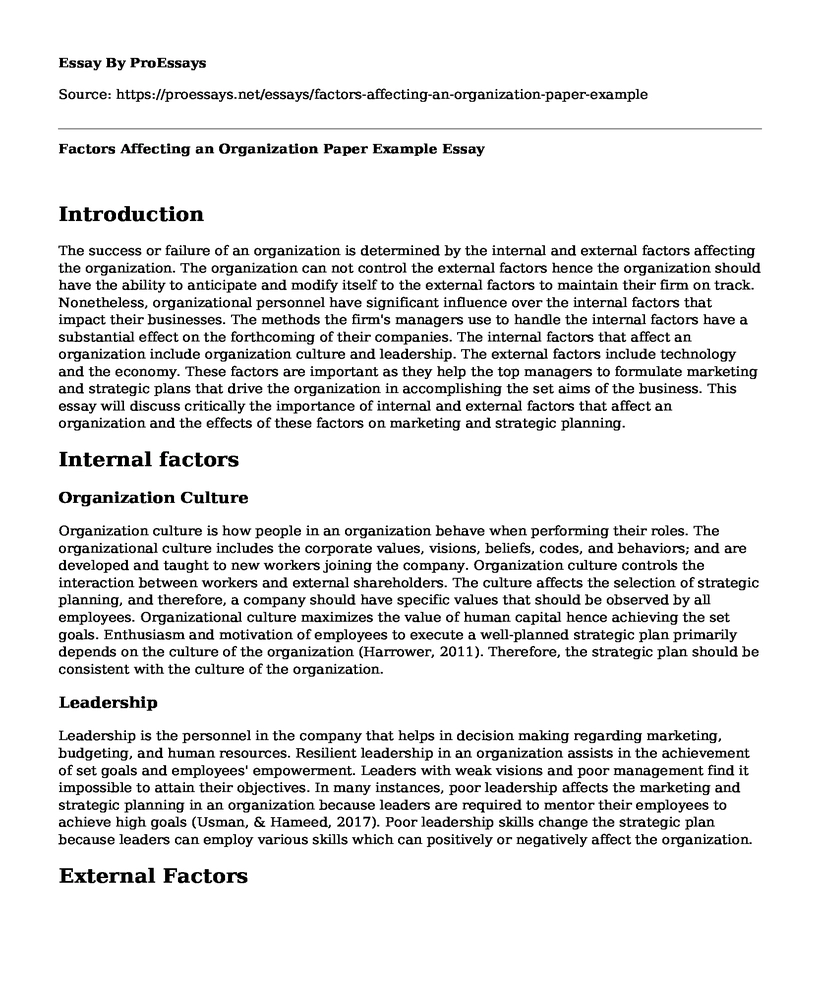Introduction
The success or failure of an organization is determined by the internal and external factors affecting the organization. The organization can not control the external factors hence the organization should have the ability to anticipate and modify itself to the external factors to maintain their firm on track. Nonetheless, organizational personnel have significant influence over the internal factors that impact their businesses. The methods the firm's managers use to handle the internal factors have a substantial effect on the forthcoming of their companies. The internal factors that affect an organization include organization culture and leadership. The external factors include technology and the economy. These factors are important as they help the top managers to formulate marketing and strategic plans that drive the organization in accomplishing the set aims of the business. This essay will discuss critically the importance of internal and external factors that affect an organization and the effects of these factors on marketing and strategic planning.
Internal factors
Organization Culture
Organization culture is how people in an organization behave when performing their roles. The organizational culture includes the corporate values, visions, beliefs, codes, and behaviors; and are developed and taught to new workers joining the company. Organization culture controls the interaction between workers and external shareholders. The culture affects the selection of strategic planning, and therefore, a company should have specific values that should be observed by all employees. Organizational culture maximizes the value of human capital hence achieving the set goals. Enthusiasm and motivation of employees to execute a well-planned strategic plan primarily depends on the culture of the organization (Harrower, 2011). Therefore, the strategic plan should be consistent with the culture of the organization.
Leadership
Leadership is the personnel in the company that helps in decision making regarding marketing, budgeting, and human resources. Resilient leadership in an organization assists in the achievement of set goals and employees' empowerment. Leaders with weak visions and poor management find it impossible to attain their objectives. In many instances, poor leadership affects the marketing and strategic planning in an organization because leaders are required to mentor their employees to achieve high goals (Usman, & Hameed, 2017). Poor leadership skills change the strategic plan because leaders can employ various skills which can positively or negatively affect the organization.
External Factors
Technology
Technology affects the quality and type of produced goods and services. The type of technology used by an organization determines the kind and the quality of the equipment to be used for the production of products and services (Syafriont, 2011). Technology influences the marketing and strategic planning as it improves the effectiveness of planning through the provision of accurate data that enables managers to make effective decisions. The technology integrates and stores essential data that is easily accessible to the appropriate people. Technology has made marketing easy because the internet allows most information to be accessed easily by buyers. Computer systems minimize the time and labor used during the production and delivery of goods through online marketing.
Economy
The economic factors that affect an organization include financial strategies, the organization of the capital market, production factors, business cycles, infrastructures, and the kind of economic system. Successful companies observe the behavior of external factors and try to reduce costs and maximize profits. Demand variation is another factor that influences the success of an organization. The economy directly impacts the methods used by marketers to sell their products to the customers. Before developing a marketing plan, an organization should consider the inflation, tax, demand and supply patterns; because, they affect the way people spend on buying products. For instance, high inflation decreases the buying power while low inflation increases the buying power. Managers who observe the economic factors of their country before doing strategic planning can attain the objectives of the organization.
References
Harrower, N.L (2011). The Effects of Organizational Culture on Marketing Programs: A Grounded Theory Study. Doctorial Dissertation in Organizational Development. Retrieved from https://ir.stthomas.edu/caps_ed_orgdev_docdiss
Syafriont, S. (2011). Factors Affecting The Manufacturing Companies' Financial Performance. Journal of Economics, Business, and Accountancy | Ventura, 14(2). doi:10.14414/jebav.v14i2.7
Usman, M., & Hameed, A. A. (2017). The Effect of Ethical Leadership on Organizational Learning: Evidence from a Petroleum Company. Business & Economic Review, 9(4), 1-22. doi:10.22547/ber/9.4.1
Cite this page
Factors Affecting an Organization Paper Example. (2022, Nov 20). Retrieved from https://proessays.net/essays/factors-affecting-an-organization-paper-example
If you are the original author of this essay and no longer wish to have it published on the ProEssays website, please click below to request its removal:
- Evaluation Essay on A.S. Watson Group: Change Management and Leadership
- Code of Ethics for Restaurant Workers Essay Example
- Analyzing Elements of Demagoguery in Kim Jong Un's New Year Speech Essay
- Essay Sample on Leadership and Direction in Health Care: Little Success in a Complex Environment
- Our Lean Start-Up Assignment: How Teamwork Achieved Success - Essay Sample
- Essay Sample on Project Management for JCDecaux: Improving the City of Lyon
- Leadership Nursing: Creating Positive Change in Healthcare - Research Paper







